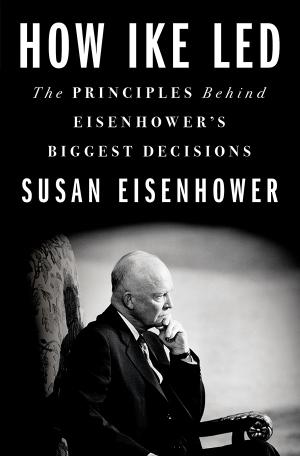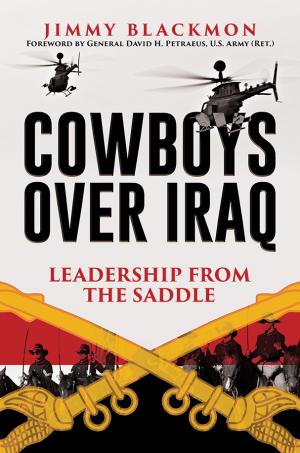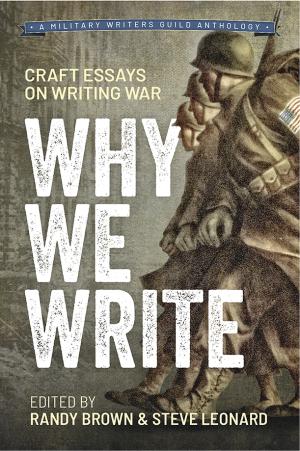August 2020 Book Reviews
August 2020 Book Reviews
Ike’s Strategic Approach to Decision-Making
How Ike Led: The Principles Behind Eisenhower’s Biggest Decisions. Susan Eisenhower. Thomas Dunne Books. 400 pages. $29.99
By Lt. Col. Daniel Sukman
Few leaders through history have made more strategic decisions that influenced world events than Dwight Eisenhower. How Ike Led: The Principles Behind Eisenhower’s Biggest Decisions uses the lens of his worldview, ethics and strategic perspective to examine the range of decisions the general and president made over the course of his service to the nation.
The author is Eisenhower’s granddaughter Susan, and her familial insights serve as the greatest strength of the book. She has authored previous books on the Eisenhower family and Eisenhower’s presidency, including Mrs. Ike: Memories and Reflections on the Life of Mamie Eisenhower and Partners in Space: U.S.-Russian Cooperation After the Cold War. Her new book combines personal knowledge of the man with her expertise of the era to help the reader understand influences that shaped Eisenhower’s thinking.
The central theme of the book is Eisenhower’s focus on making decisions from the strategic perspective, in the sense that the long-term consequences were paramount. The author recounts Gen. Eisenhower ordering the collection of visual evidence of German-run concentration camps. Eisenhower, through his strategic perspective, had the foresight to know that future generations would forget or deny that the Nazi crimes against humanity took place. Preserving the evidence and ensuring political leaders and the public would see the consequences of those atrocious crimes made gathering and protecting evidence a critical task.
Eisenhower’s focus on longevity played out in his effort to support civil rights. As president, Eisenhower was instrumental in passing the Civil Rights Act of 1957, and he later would use the full force of the executive branch and the military to enforce the Supreme Court decision Brown v. Board of Education. President Eisenhower, as the author details, understood he could not change the minds of tens of millions of Americans in eight short years. Rather, through appointing federal judges, he could create the conditions for the advancement of civil rights after his terms in office.
A secondary theme throughout the book is Eisenhower’s ability to communicate with people. Empathy was critical to Eisenhower’s internal decision-making process. The author presents case after case when Eisenhower considered the perspective of those affected by his decisions. The author uses as an example Eisenhower’s decision to proceed with the airborne landings on D-Day only after conferring with his subordinate commanders. Even though Eisenhower would go against the advice of Britain’s Air Chief Marshal Sir Trafford Leigh-Mallory, including all perspectives helped maintain cohesion between leaders at the strategic level. The author presents other examples such as the Solarium Project, which helped develop a coherent strategy against communism.
How Ike Led is a powerful addition to a leader’s bookshelf. The author’s unique perspective as Eisenhower’s granddaughter offers the reader personal anecdotes and insights on strategic thought and character not found in previously published biographies of Eisenhower. To understand Dwight Eisenhower, read Susan Eisenhower.
Lt. Col. Daniel Sukman is a strategist and member of the military faculty at the Joint Forces Staff College, Virginia. He served multiple combat tours in Iraq and Afghanistan.
* * *
Squadron Forges Bonds in a War Zone
Cowboys Over Iraq: Leadership from the Saddle. Jimmy Blackmon. Post Hill Press. 384 pages. $27
By Col. Gregory Fontenot, U.S. Army retired
Cowboys Over Iraq: Leadership from the Saddle is a sophisticated and compelling account of leadership. Author Jimmy Blackmon clearly loved serving in the 2nd Squadron, 17th Cavalry Regiment. He joined the squadron as operations officer upon graduating from the U.S. Army Command and General Staff College in 2003. He arrived in Mosul, Iraq, after the invasion, during the brief period when it appeared coalition forces were in control. He joined a well-led unit in the well-led 101st Airborne Division (Air Assault). The squadron commander, Lt. Col. Stephen Schiller, was on his third combat deployment.
Blackmon’s story is partly retrospective. The first few chapters recount the fighting during the invasion of Iraq before his arrival. Blackmon places the reader in the post-invasion rhythm of life in Iraq that includes war stories and cigars at the end of the day. This pattern endures, along with the less-well-known activity of driving golf balls into Saddam Hussein’s artificial lake, renowned for its huge carp and the grotesque Al Faw Palace.
Cowboys Over Iraq does not default to a tale of guns, guidons and glory. Instead, Blackmon shares his feelings of connection to those with whom he served, and explains how those connections grew. These feelings formed in moments of fear and danger but also during the more mundane moments between “alarums and excursions,” as Shakespeare put it. Blackmon’s admiration for those with whom he served is clear, especially his admiration of Schiller. In his preface, he compares Schiller to Lt. Col. Bill Kilgore, the air cavalryman in the movie Apocalypse Now who famously says, “Charlie don’t surf”—fearless and maybe a little crazy.
Blackmon understands that leadership includes a bit of role-playing. But throughout Cowboys Over Iraq, Blackmon shows he learned about leadership by reflecting critically not only on his own efforts but also on the efforts of those around him. The squadron had to show agility; in addition to fighting, the squadron and its leaders had to learn to work within the framework of counterinsurgency, including “key leader engagements.”
Blackmon underwent immersion in an alien culture, and it was not always comfortable for him. His tales of error, surprise and occasionally, irritation, led to empathy because he was open to learning. Empathy enabled him and others in the squadron to become more effective even before Field Manual 3-24: Insurgencies and Countering Insurgencies was written.
Without preaching about fighting one day and having chai and a chat with the locals the next, Blackmon shares what he learned about moving along the spectrum of conflict and cooperation. These are lessons that have been learned and relearned. The institution needs to retain the means to prepare some other Jimmy Blackmon for a similar problem in the future.
Cowboys Over Iraq is the story of how Blackmon and his fellow troopers learned by reflecting on their operations. Blackmon’s approach is brilliant, promising to give “the reader a campstool around the fire and a cigar at the table, as we [members of the 2nd Squadron] forged bonds which time has no power to diminish.”
This is a great addition to the growing body of recollections of service in the long wars following 9/11.
Col. Gregory Fontenot, U.S. Army retired, commanded a tank battalion in Operation Desert Storm and an armor brigade in Bosnia. A former director of the School of Advanced Military Studies, his latest book is Loss and Redemption at St. Vith: The Seventh Armored Division in the Battle of the Bulge.
* * *
Encouraging Military Writers
Why We Write: Craft Essays on Writing War. Edited by Randy Brown and Steve Leonard. Middle West Press. 256 pages. $19.99
By Lt. Gen. David Barno, U.S. Army retired
Writing about war serves many purposes. It captures the unique experience of battle, even if imperfectly, for those who will never fight. It allows those who have fought to reflect, digest, and perhaps put to rest some of what they have seen and done.
And it leaves a kaleidoscopic record of the unique individual sacrifices and struggles of those who put on their nation’s uniform and go into harm’s way at the behest of their fellow citizens. Writing about war, in short, is essential if there is any hope for mankind to absorb and learn from this recurrent human affliction. And we are fortunate that in today’s world, there are more ways to capture and share these experiences than ever before.
Why We Write: Craft Essays on Writing War is a fascinating, if highly eclectic, anthology published in partnership with the nonprofit Military Writers Guild. Edited by Randy Brown and Steve Leonard, the book represents a diverse collection of over 60 authors whose myriad contributions defy easy description. Brown (an award-winning poet and journalist) and Leonard (better known to military audiences as Doctrine Man) have compiled a wide-ranging collection of essays that traverses virtually the entire galaxy of military writing. The book’s contributors include well-known chroniclers of recent wars and their aftermath such as Tom Ricks, Phil Klay, Gayle Tzemach Lemmon and Kori Schake, and best-selling novelists and science fiction writers like P.W. Singer and August Cole (Ghost Fleet) and Max Brooks (World War Z).
But the work also corrals a rich trove of relatively new and unconventional authors of books, blogs, short stories and poetry on subjects ranging from intimate wartime reflections to practical advice on crafting an op-ed or article for publication. The elusive connective tissue in this comprehensive collection is simply making the case for the fundamental value of writing for those who serve in uniform, and for those around them. The book mixes both finely drawn essays with gentle but firm encouragement to all those who are hesitant to pick up their pen or confront their cold keyboard.
Despite this unusual format, Why We Write belongs on the shelf of every aspiring writer of things military. For the majority of those who have served in uniform, writing is neither their natural forte nor most practiced soldierly skill. Writing for publication, to have your written words cast on stage into the bright scrutiny of peers and superiors, is more foreign and intimidating still.
This diverse work can help any hesitant aspiring author navigate those seemingly daunting rapids. It is both a handbook and an exemplar for those who have something to say but don’t know quite how to say it. In that alone, it merits special praise as a work specifically designed to nurture and encourage those who have never taken the plunge of putting pen to publication. For all of us eager to hear these new stories, Brown and Leonard have done a great service in assembling such a hearty menu of helpful writing advice and techniques.
Lt. Gen. David Barno, U.S. Army retired, is a visiting professor of strategic studies at the Johns Hopkins School of Advanced International Studies, Washington, D.C., and a contributing editor to War on the Rocks. During his 30-year Army career, he served as an infantry officer with three tours in the 75th Ranger Regiment, which included combat during the Grenada and Panama invasions. From 2003 to 2005, he commanded U.S. and coalition forces in Afghanistan.
* * *
America Struggles Against Irregular Warfare
The Dragons and the Snakes: How the Rest Learned to Fight the West. David Kilcullen. Oxford University Press. 336 pages. $27.95
By Derek Leebaert
David Kilcullen’s starting point in The Dragons and the Snakes: How the Rest Learned to Fight the West is the triumphant first decade after the Cold War. What, he asks, have other states—notably Russia and China (the “dragons”)—and terrorists (the “snakes”) learned from America’s retaliation against the Taliban, the invasion of Iraq and an open-ended war on terror? How have such opponents adapted, and what are the implications for America’s defense?
His answers are both vivid and frustrating.
We dash with Kilcullen through Norway’s Arctic forests on a Polaris quad bike at “the edge of Europe,” 25 feet from Russia’s frontiers. But he also walks us through thickets of social science jargon and references to argue that “unquestioned US conventional warfighting dominance is [now] very much a thing of the past.”
This occurs because our opponents have, under the stresses of conflict, specifically adapted their capabilities to counter and compete with America. Outclassed by U.S. strength, Russia, for instance, has come to emphasize hybrid war. It fights barely beneath the radar, as with anonymous combatants in Ukraine. The Islamic State group, in turn, uses sophisticated electronics and artillery that show, as explained in unneeded academic jargon, how “guerrilla groups may unconsciously morph through processes of blind variation and selective retention.”
Kilcullen is an anthropologist, a professor and former Australian army officer who advised Washington and NATO. Impressively, this is his fifth book on irregular warfare. Its arguments, timeliness and abundance of detail could qualify it for the U.S. Army’s professional military education programs. We also learn, for instance, that “the vast majority (81 percent) of suicide attacks during the Israeli occupation [of Lebanon] (1982–86) were carried out by Christians or affiliates of secular or leftist parties.” This insight reflects one of Kilcullen’s strengths. Throughout, he illuminates an opponent’s perspective.
Yet his final chapter underscores the difficulties of this slim volume: Kilcullen tackles a huge subject—not just military adaptation but, ultimately, the “Ebb Tide of the West,” and he cites Oswald Spengler, Arnold Toynbee, Edward Gibbon and Ibn Khaldun’s medieval text Muqaddimah, among other learned sources, to do so. In the end, a reader asks what’s really new behind all the erudition in this book, other than its well-studied details and its accumulation of scholarly references.
The argument that beaten or failing armies are compelled to adapt is familiar. Armies have done so since Troy, and it’s no surprise that Russia as well as substate terrorist entities have equally done so over recent decades. For centuries, warriors have become more skilled as they face more-skilled opponents and operate in more-skilled societies. This includes guerrillas whose transformation into savvy, professionalized commando units is a staple of the literature. Nor is Russia’s use of hybrid warfare novel. Russia has found that approach politically convenient at least since it tried to split Iran in 1945–46.
Minus irony or attribution, Kilcullen closes with words from President John Kennedy’s inaugural address. The nation, Kilcullen writes, must gird for “the long twilight struggle” ahead. In 1961, America was about to go big into Vietnam where “US conventional warfighting dominance” would already prove “very much a thing of the past.” Like Vietnam, America’s wars in Iraq and Afghanistan have also ended up unrecognizable and far from the missions declared at the start. Our enemies’ abilities to adapt to our strengths provide only a small part of the reason.
Derek Leebaert served in the Marine Corps and is a former director of the Army Historical Foundation. His books include To Dare and to Conquer: Special Operations and the Destiny of Nations, from Achilles to Al Qaeda.





